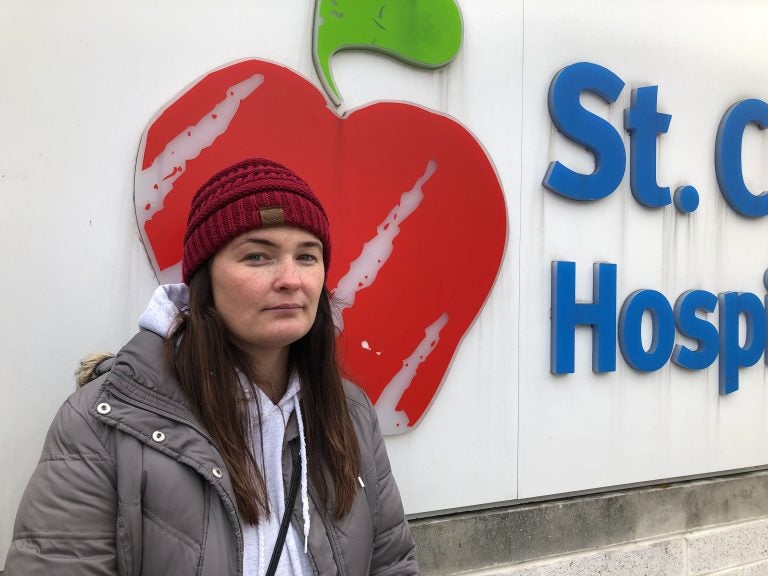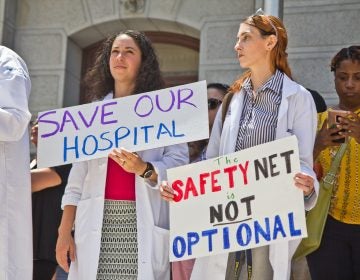Tower Health clashes with nurses as it takes over St. Christopher’s
Nurses at the pediatric hospital are losing all the paid time off they earned under the previous owner. They also want safe staffing ensured.
Listen 1:16
Amanda Gilson has worked in the NICU at st Christopher’s for almost five years. She saved up hundreds of hours of paid time off to use during her maternity leave, which she just learned will not roll over under the hospital’s new ownership. (Nina Feldman/WHYY)
Nurses at St. Christopher’s Hospital for Children are angry.
Effective Sunday, the hospital’s operations officially will be in the hands of Tower Health and Drexel University. The duo paid $50 million for St. Christopher’s at auction after its previous owner, Philadelphia Academic Health System, filed for Chapter 11 bankruptcy and announced it would close its other hospital, Hahnemann University Hospital. The intention was always to keep the profitable St. Christopher’s open and sell it.
Tower Health and Drexel agreed to recognize the Pennsylvania Association of Staff Nurses and Allied Professionals, the union that represents 500 registered nurses, as their bargaining entity. But the new owners did not agree to assume the nurses’ old contract, so the union has been negotiating a new one. After the initial bargaining session, the nurses are not happy with how things are going.
Their first issue: Paid time off nurses accrued up until the previous owner declared bankruptcy in July will not roll over. That means Amanda Gilson, who gave birth to a baby boy 2 ½ weeks ago by Caesarean section, cannot use the time off she’s been saving up for the last year.
“I didn’t take a vacation this year to be able to spend the time at home with my family, and it’s all being taken away from me,” said Gilson, a nurse who has worked in the neonatal intensive care unit at St. Christopher’s for almost five years.
Under the hospital’s old system, a woman had to use paid time off to cover the first two weeks away after giving birth. Afterward, disability would kick in and pay for six more weeks. Then, if she wanted more time, which is especially common for women recovering from C-sections, an employee could use more of her paid time off.
Gilson said she saved up 216 hours of paid time off, which would have covered all 12 weeks. She just found out she now has only enough to cover those first two weeks.
“It’s making me very anxious,” Gilson said. “And it’s unfair.”
Tower Health said it is not responsible for resolving any of the prior owner’s financial obligations, and blamed the Philadelphia Academic Health System bankruptcy for the paid time off not rolling over.
“We empathize with everyone affected by the loss of PTO accrued prior to July 1, 2019,” Jessica Bezler, a Tower Health representative, said in a statement. “It is a very unfortunate situation that is a result of the bankruptcy of St. Christopher’s prior owner. Despite what the union says, however, neither Tower nor Drexel are responsible for this lost time, nor are we in any position to restore any PTO.”
A union spokesman estimated that some people had accumulated up to 300 hours, or $15,000 worth of paid time off.
Safe staffing
Also of importance to many of the nurses is maintaining language in the contract that upholds nurse-to-patient staffing ratios. A provision they just won in January, the language ensures the enforcement of staffing “grids” that outline how many nurses are needed to care for how many patients in each department, depending on how sick the patients are.
Maria Plano, vice president of the nurses union at St. Christopher’s, said those ratios are especially important in a pediatric hospital.
“You can reason with an adult,” said Plano, who has worked at St. Christopher’s for 15 years. “I can tell you, ‘Don’t pull out your IV, don’t jump out of bed, you’re not allowed to eat because you’re having a procedure.’ With kids, it’s different. Those minimum amount of patients, it’s for a really good reason in pediatrics because you have to be extra vigilant with them.”
Nurses say too few of them assigned to a floor can lead to fatigue, burnout and poor overall patient care. Since the union won the staffing language in January, Plano said, St. Christopher’s was forced to hire more nurses to meet the grid requirements. She’s afraid that without the language in the new contract, nurses will be laid off.
In a statement, Bezler wrote that Tower Health does not use staffing grids at any of its hospitals. In addition to St. Christopher’s, it operates five other hospitals regionally, with its flagship in Reading. The Pennsylvania Association of Staff Nurses and Allied Professionals also represents the nurses at Tower’s Pottstown Hospital.
“Tower Health does not believe that mandated staffing grids and ratios are the solution to providing quality care,” wrote Bezler. Safe staffing ratios have been an increasingly common demand in contract negotiations, and are the reason why health care workers are organizing nationwide.
“Grids are coming whether they like it or not,” said Plano. “They’re here at St. Chris, and we refuse to go backwards.”
In exchange for staffing language and rolling over nurses’ paid time off, the union offered to switch to Tower’s paid-time-off plan going forward and to their health benefits platform for the two years remaining in the contract. The union’s chief negotiator, Jerry Silberman, said once the contract expires, all of it will be renegotiated, but he thinks it’s a waste to do that now.
“If Tower is serious about rebuilding this hospital, they shouldn’t be wasting tens of thousands of dollars in negotiations and lost goodwill and nurses leaving, because that’s what’ll happen,” Silberman said.
The next bargaining session is scheduled for Thursday, Dec. 19.
WHYY is your source for fact-based, in-depth journalism and information. As a nonprofit organization, we rely on financial support from readers like you. Please give today.





